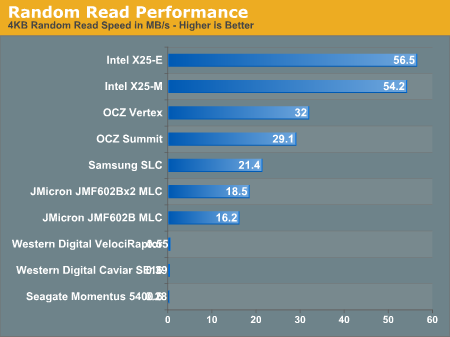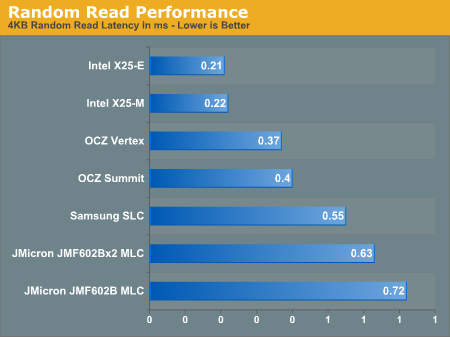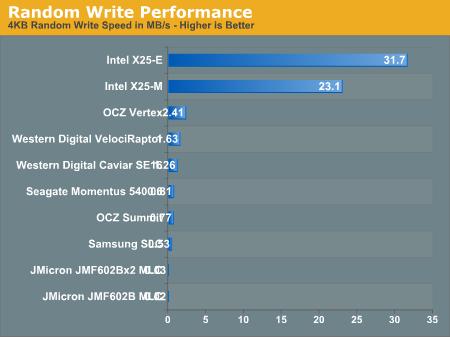The SSD Anthology: Understanding SSDs and New Drives from OCZ
by Anand Lal Shimpi on March 18, 2009 12:00 AM EST- Posted in
- Storage
Random Read/Write Performance
Arguably much more important to any PC user than sequential read/write performance is random access performance. It's not often that you're writing large files sequentially to your disk, but you do encounter tons of small file reads/writes as you use your PC.
To measure random read/write performance I created an iometer script that peppered the drive with random requests, with an IO queue depth of 3 (to add some multitasking spice to the test). The write test was performed over an 8GB range on the drive, while the read test was performed across the whole drive. I ran the test for 3 minutes.

The three hard drives all posted scores below 1MB/s and thus aren't visible on our graph above. This is where SSDs shine and no hard drive, regardless of how many you RAID together, can come close.
The two Intel drives top the charts and maintain a huge lead. The OCZ Vertex actually beats out the more expensive (and unreleased) Summit drive with a respectable 32MB/s transfer rate here. Note that the Vertex is also faster than last year's Samsung SLC drive that everyone was selling for $1000. Even the JMicron drives do just fine here.
If we look at latency instead of transfer rate it helps put things in perspective:

Read latencies for hard drives have always been measured in several ms, but every single SSD here manages to complete random reads in less than 1ms under load.
Random write speed is where we can thin the SSD flock:

Only the Intel drives and to an extent, the OCZ Vertex, post numbers visible on this scale. Let's go to a table to see everything in greater detail:
| 4KB Random Write Speed | |
| Intel X25-E | 31.7 MB/s |
| Intel X25-M | 23.1 MB/s |
| JMicron JMF602B MLC | 0.02 MB/s |
| JMicron JMF602Bx2 MLC | 0.03 MB/s |
| OCZ Summit | 0.77 MB/s |
| OCZ Vertex | 2.41 MB/s |
| Samsung SLC | 0.53 MB/s |
| Seagate Momentus 5400.6 | 0.81 MB/s |
| Western Digital Caviar SE16 | 1.26 MB/s |
| Western Digital VelociRaptor | 1.63 MB/s |
Every single drive other than the Intel X25-E, X25-M and OCZ's Vertex is slower than the 2.5" Seagate Momentus 5400.6 hard drive in this test. The Vertex, thanks to OCZ's tweaks, is now 48% faster than the VelociRaptor.
The Intel drives are of course architected for the type of performance needed on a desktop/notebook and thus they deliver very high random write performance.
Random write performance is merely one corner of the performance world. A drive needs good sequential read, sequential write, random read and random write performance. The fatal mistake is that most vendors ignore random write performance and simply try to post the best sequential read/write speeds; doing so simply produces a drive that's undesirable.
While the Vertex is slower than Intel's X25-M, it's also about half the price per GB. And note that the Vertex is still 48% faster than the VelociRaptor here, and multiple times faster in the other tests.










250 Comments
View All Comments
siberx - Thursday, March 19, 2009 - link
This is, very likely, the best article I have ever read, period. Online, in magazines, about any subject... this was an absolutely fantastic read. Suddenly, all smoke surrounding SSDs has cleared and the truth shines through in editorial brilliance. It's great to see that at least some computer news sites out there can still cut through the crap and get to the heart of the issue. My already high opinion of AnandTech has risen even further.Thank you for taking the immense time it must have taken to compile and assemble all this information - this article is now a must-read for *anybody* considering purchasing an SSD, and it's just about all the background you could need in one place.
In addition to all the extremely useful general SSD information contained within, the detailing of the issues with the JMicron controllers as well as OCZ's efforts to address the concerns to produce the best product possible (despite the reduced marketability to the uninformed) is reassuring and comforting in a world where tech companies seem more concerned with how much they can deceive their customers instead of producing quality products.
In short, the article is a win on all fronts, thank you greatly for posting it. When I purchase my first SSD (which I'm considering doing reasonably soon) this article, its information and suggestions, and OCZs actions to resolve the issues with its drives will definitely be at the forefront of my mind.
jkua - Thursday, March 19, 2009 - link
I have to say, I really appreciate the effort and throughness with which you have covered the state of the SSD market today. As an engineer and scientist, I applaud your methods in tracking down and reporting the major issues with SSDs. As a consumer, I really appreciate the timeliness of this article as I was just thinking of putting an SSD in a netbook for a robotics application where mechanical drives are not ideal.Cheers!
jkua - Thursday, March 19, 2009 - link
That said, one thing I would have like to have seen is some numbers on power consumption for these drives compared to average mechanical desktop and laptop drives.aamsel - Thursday, March 19, 2009 - link
Anyone have a link to the Intel HDD ERASE program that Anand referred to?HolyFire - Thursday, March 19, 2009 - link
http://www.ultimatebootcd.com/download.html">http://www.ultimatebootcd.com/download.html (includes HDD erase 3.1)http://cmrr.ucsd.edu/people/Hughes/SecureErase.sht...">http://cmrr.ucsd.edu/people/Hughes/SecureErase.sht... (version 4.0)
AnnonymousCoward - Thursday, March 19, 2009 - link
AWESOME ARTICLE.The huge difference in read/write flash performance looks a lot like this article: http://www.anandtech.com/memory/showdoc.aspx?i=257...">http://www.anandtech.com/memory/showdoc.aspx?i=257...
wind glider - Thursday, March 19, 2009 - link
Thanks for the orgasmic review.wicko - Wednesday, March 18, 2009 - link
Had a really good read here, thanks for the history and info, Anand. The only thing I don't understand is what the importance of random write is? What kind of task would benefit from high random write speeds (maybe copying many files at once)? I'm tempted to pick up a vertex drive but it depends on whether or not random write will be important for me. But the price... whoa, pretty damn expensive here in Canada.. http://www.ncix.com/products/index.php?sku=36023&a...">http://www.ncix.com/products/index.php?...X120G&am... - $625 for a 120GB!!! I kind of want 2, for RAID0, I have a lot of games installed (steam folder alone is 100GB lol). Might even have to raid 3 of em.. but not for $1800 lol.strikeback03 - Thursday, March 19, 2009 - link
As mentioned in the article, the OS in general makes lots of random writes. Send an IM, it writes to a log. Load a website, it caches some images.AnnonymousCoward - Thursday, March 19, 2009 - link
>I'm tempted to pick up a vertex drive but it depends on>whether or not random write will be important for me.
Keep in mind, its random write is twice as fast as mechanical HDs.
>But the price...
It's only $110USD/32GB.